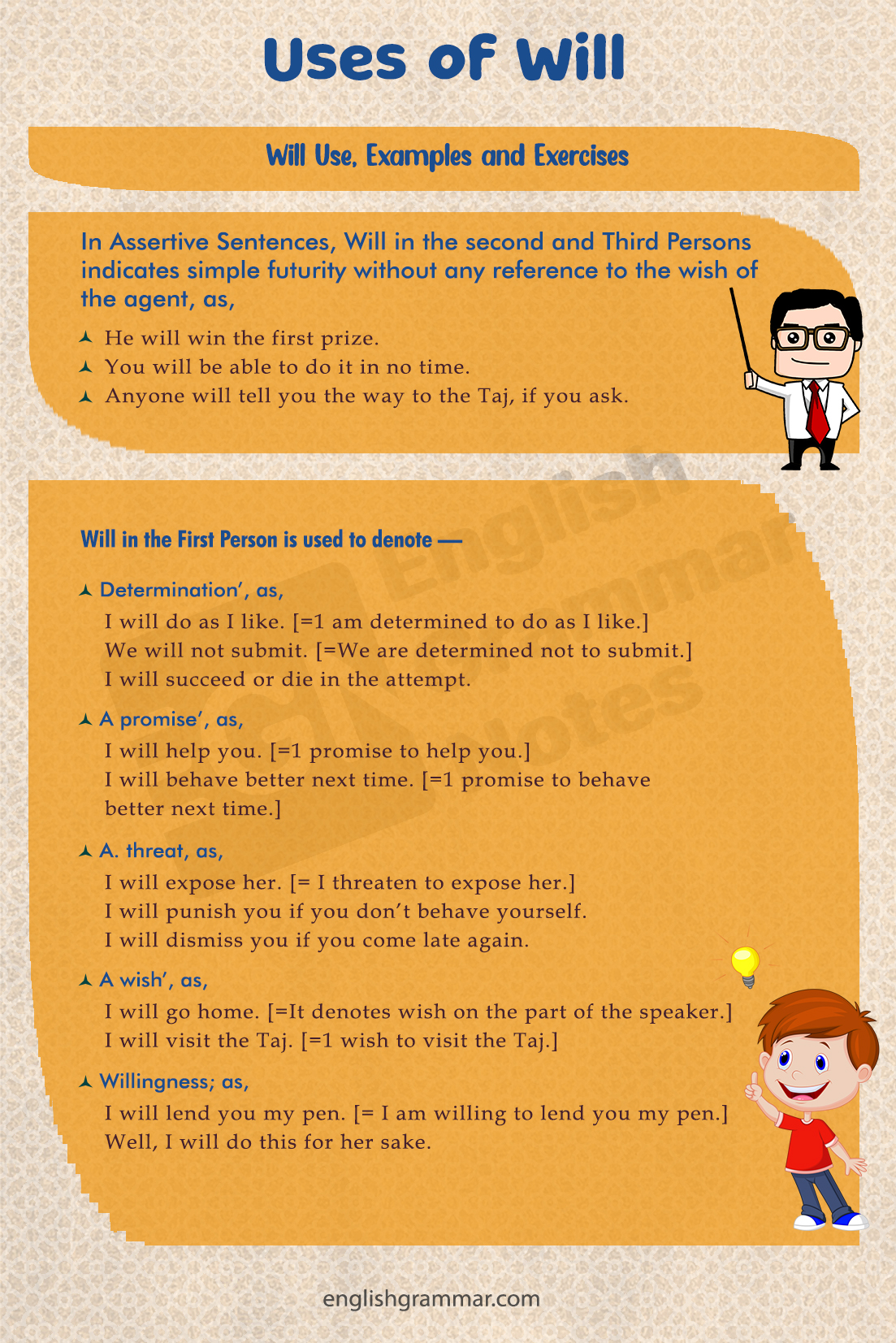Will Use, Examples and Exercises
In Assertive Sentences, Will in the second and Third Persons indicates simple futurity without any reference to the wish of the agent, as,
He will win the first prize.
You will be able to do it in no time.
Anyone will tell you the way to the Taj, if you ask.
Will in the First Person is used to denote —
- Determination’, as,
I will do as I like. [=1 am determined to do as I like.]
We will not submit. [=We are determined not to submit.]
I will succeed or die in the attempt. - A promise’, as,
I will help you. [=1 promise to help you.]
I will behave better next time. [=1 promise to behave better next time.] - A. threat, as,
I will expose her. [= I threaten to expose her.]
I will punish you if you don’t behave yourself.
I will dismiss you if you come late again. - A wish’, as,
I will go home. [=It denotes wish on the part of the speaker.]
I will visit the Taj. [=1 wish to visit the Taj.] - Willingness; as,
I will lend you my pen. [= I am willing to lend you my pen.]
Well, I will do this for her sake.

In Interrogative Sentences—
- Will is not used at all in the First Person. Never say :
Will I? Will we? - Will denotes willingness, intention or wish of the person spoken to in the Second Person as,
Will you sing at the concert tomorrow evening? Yes, I will.
Will you go there? [=Do you intend to go there?]
Will you speak to her? [=Do you wish to speak to her?] - Will denotes simple futurity in the Third Person; as,
Will he come today?
Will they help us? - The most usual form of request is that introduced by Will you?
Will you open the window? [= Please open the window.]
Will you lend me your book?
Will you have another cup of tea?
CORRECT USAGE
Mark the force of shall and will in the following sentences :
- You shall be rewarded. [= I am resolved to have you rewarded.]
- He shall be rewarded. [= I am resolved to have him rewarded.]
- I will not be able to go to office today. [This is incorrect, for it expresses the determination or will of the speaker. Use ‘shall’ instead of ‘will’
- I will be happy to do so. [‘Happy’ here implies ‘willingness’, and to say ‘I will be happy’ is like saying, ‘I will be willing’. This is absurd. Say, therefore, ‘I shall be happy.’]
- I will have much pleasure in accepting your kind invitation. [The sentence as it stands implies an effort of will on the part of the speaker to feel pleasure. This is absurd. Say, ‘I shall have………………………………………………….. ’]Will you kindly lend me your pen? [Here ‘will’ is used interrogatively in a polite form of request.]
- I shall be obliged if you lend me fifty rupees, [‘shall’ is used to express a polite form of request.]
Exercise 1: Fill in the blanks with ‘shall’ or ‘will’. If in a sentence, both can be inserted, explain the difference in meaning :
- I______________ never go there.
- I______ try to do better the next time.
- you lend me your book?
- You______________ have a reward for your trouble;
- We______________ have our way.
- We______________ be happy to see you.
- He_______________ never make that mistake again.
- You______________ succeed, if you try.
- I______________ punish Mohan if he does that again.
- I ‘_____________ succeed or die in the attempt.
- ‘Villain’, said the Emperor, ‘you_________ ’
- Tomorrow we _____________ have a holiday.
- Thou _____________ love thy neighbour as thyself.
- I _____________ Call at Your house tomorrow.
- I _____________ be obliged to dismiss him.
- I fear, I _____________ be late for the meeting.
- You_______ be punished for having done all this.
- He says that he_____________ never pay the money.
- What______ we do today? We_____ go out on the river.
- He who wastes not, _____________ never want.
- Never, never _____________ we have such a kind king again.
- As you wish it, I _____________ go there.
- I _____________ avenge her.
- _____________ you please close the door.
- Alas! _____________ be drowned and nobody _____________ save me.